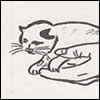In Parshat Emor, the Torah presents a unique mitzvah that prohibits slaughtering a mother animal and her offspring on the same day:
An ox or a sheep, you shall not slaughter it and its young on the same day.1
According to the Talmud2 and as codified by Maimonides et al,3 the prohibition applies when a mother animal and her offspring—whether male or female—are both ritually slaughtered on the same calendar day, regardless of who performs the slaughter or where it takes place. It applies only to kosher domestic animals (cattle, sheep, and goats), and only the mother-offspring pair, not the father.
What is the reason behind this commandment? Various classic commentators have offered different explanations.
1. Spare the Mother’s Suffering
Maimonides explains that the mitzvah is based on the principle of avoiding animal suffering (tza’ar ba’alei chayim).4 The Torah seeks to spare the mother animal from the anguish of seeing her offspring slaughtered. Maimonides argues that there is no essential difference between the emotional bond of a human mother and that of an animal mother—they both have natural love and mercy toward their young. Therefore, this act would be inhumane.
This view is also found in the Midrash:
Why is a baby circumcised on the eighth day? Because the Holy One, blessed be He, has compassion on him, granting him time until he gains strength. And just as G‑d’s mercy extends to human beings, so too does His mercy extend to animals. From where is this derived? As it is written: “And from the eighth day onward, it shall be accepted as a sacrifice.”5 And not only that, but G‑d also said: “You shall not slaughter it and its offspring on the same day,” etc.6
Bechor Shor concurs and adds that this prohibition applies only to the mother and not the father, precisely because the maternal bond is stronger. A mother’s emotional connection to her offspring is deeper, and the Torah’s concern lies with the pain she might experience.
2. Cultivating Compassion
Ibn Ezra offers a different perspective: While others see this mitzvah as an expression of compassion toward animals, Ibn Ezra emphasizes its role in shaping human character. One who is capable of slaughtering both a mother and her young on the same day risks becoming emotionally desensitized, gradually dulling their sense of mercy. Such behavior can lead to the development of cruel and callous traits, undermining the Torah's goal of refining human character through even the most technical of mitzvot.7
3. Preserving Species
Nachmanides agrees with Ibn Ezra’s reasoning and also suggests an additional explanation. In his view, slaughtering both the mother and the offspring in one day resembles eradicating an entire species. If such behavior became widespread, it could lead to extinction. The Torah, which values the preservation of creation, forbids this to ensure that species are not wiped out.8
4. A Hidden Reason
Some understand this mitzvah to ultimately be beyond human understanding. It may fall into the category of chukim—commandments whose rationale is hidden from us. Our role is to observe the mitzvah out of faith and submission to Divine will, even if we do not grasp its logic. The Torah, therefore, concludes:
You shall keep My commandments and perform them. I am the L-rd. You shall not desecrate My Holy Name. I shall be sanctified amidst the children of Israel. I am the L-rd Who sanctifies you, Who took you out of the land of Egypt, to be a G‑d to you. I am the L-rd.9
The emphasis is on “I am the L‑rd”—the Creator who understands the nature of all beings and whose wisdom exceeds human understanding. G‑d reminds us that we accept His commandments because He demonstrated His power when He took us out of Egypt with wonders and miracles—whether or not we understand the reasoning behind a mitzvah is irrelevant.10
5. Preventing the Desecration of G‑d’s Name
The Rebbe, however, understood this mitzvah in line with Maimonides’ explanation—based on the Midrash and Zohar11—as a rational, ethical law rooted in compassion. Since it directly follows the verse commanding that a newborn remain with its mother for seven days, both are seen as expressions of mercy, intended to prevent causing emotional distress to the animal.
Accordingly, the Rebbe offers a divergent reading of the concluding verses. Because this is a moral law that even non-Jews recognize, the Torah concludes with, “You shall keep My commandments”—referring specifically to rational mitzvot—and “You shall not desecrate My holy Name”, teaching that failure to uphold such universally understood ethics can result in a chilul Hashem—a desecration of G‑d’s Name—in the eyes of the nations.12






Join the Discussion